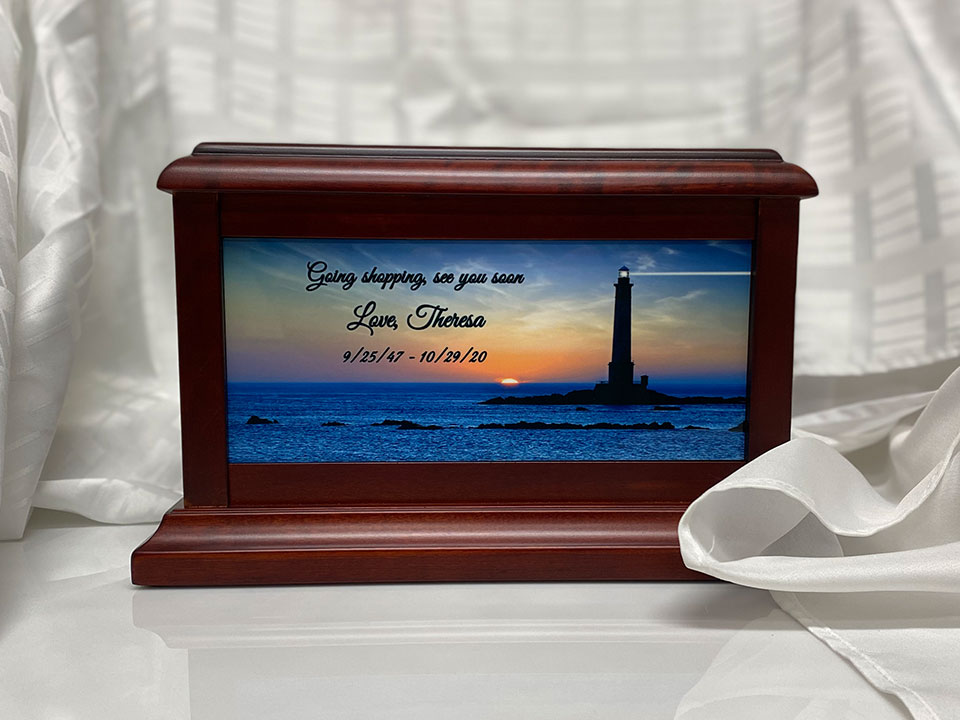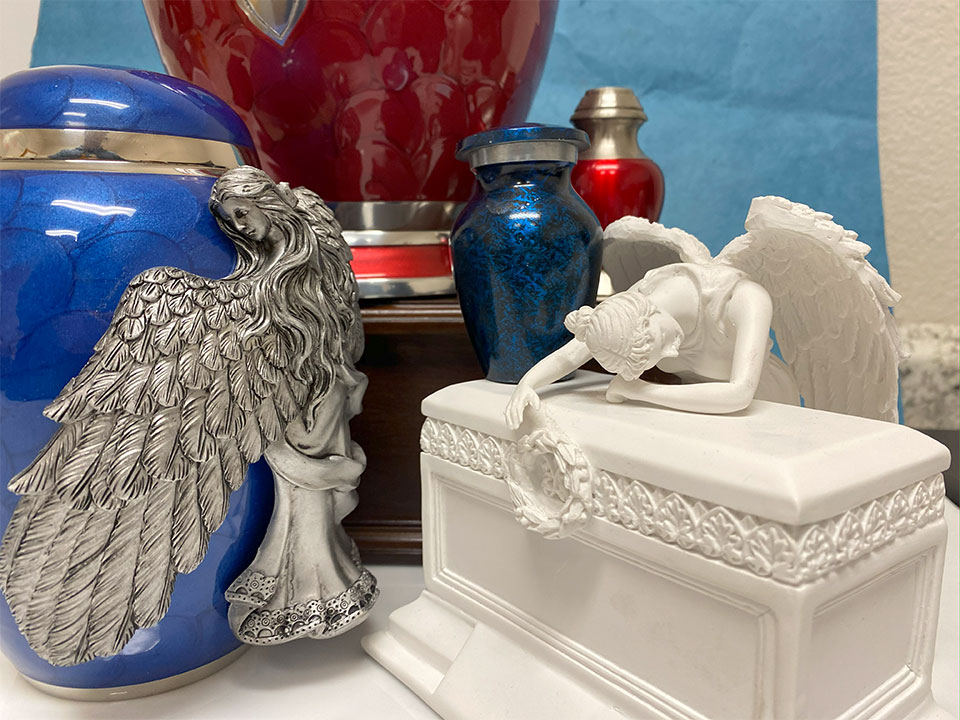The Most Common Materials for Cremation Urns
Buying an urn presents a challenge that some people don’t expect. If you’re in the middle of grieving for a loved one, the options could overwhelm you. Fortunately, the amazing selection can give you a great opportunity to find the perfect urn. You can choose from urns in a variety of sizes, materials, prices, and more.
The design and appearance of the urn might be the most important decision for you, and the material tends to affect the design most. You can select materials based on the application, customization, and general style. Although urns made of metal, ceramic, or wood are the best-known, there are more options than you might imagine. Here are a few things you should know about choosing urn materials, to guide your shopping and simplify the process.
When you start browsing cremation urns, you may notice that urns come in several different materials. The most common urn materials include:
- Ceramic
- Pewter
- Marble
- Glass
- Wood
- Metal
- Brass
- Plastic
- Fiber Cellulose
- Resin
- Leather
Before you get your heart set on a particular option, you should make sure that it will work for your purposes, last as long as you need it, fit in your budget, and provide the level of customization you expect.
Where Will You Put the Urn?
The urn’s final resting place often makes the biggest factor in material choice. If you need to place the urn outside, exposed to the elements, you should choose a highly durable material like stone, metal, or resin. Similarly, if you plan to bury the urn, you need a material that will support the weight of the earth. Before you buy an urn to put in a cemetery’s columbarium, you should confirm that the urn meets the cemetery’s rules for materials and size.
How Durable Is the Urn Material?
For durability, the best urn materials are metal, wood, ceramic, and marble. If you plan to place the urn outside or bury it, you probably need the most durable materials. By comparison, if you want to keep the urn in a place of honor in your home, most materials should work well. For water burial, scattering, or green burial, you may need to choose a biodegradable option.
What Is Your Budget?
Budget may determine your options for urn materials, as well. Most urns cost $10 to $600 or more. Keepsake urns and biodegradable urns tend to cost the least, especially those that are particularly small or meant for scattering or water burial. Urns made of durable materials typically cost $150 to $500 for adult sizes, but they may cost more for unique designs or companion urns.
Do You Want Engraving or Other Customization?
Customization, such as photo printing, engraving, and other additions, may affect the cremation urn materials you choose. You can get engraving on most materials, but the type of engraving and the cost depends on the vendor. Some urn manufacturers offer the ability to print a custom image directly onto materials like wood or metal, including In The Light Urns. If you’re not sure whether your idea will work on a particular urn material, you should consult the vendor directly to confirm.
Metal Cremation Urns
Metal urns offer some of the most classic designs for your loved one. Although they come in different shapes, sizes, and colors, when you think of an iconic urn, you’re probably thinking of metal. Within this category, you can choose different types of metal:
- Stainless Steel
- Pewter
- Brass
- Precious metals, such as gold or silver
Durable metals, such as brass or pewter, make popular choices for placement in a cemetery’s columbarium or urn vault. You can get a variety of designs that look beautiful for placement in your home, as well. Most metal urns cost $150 to $400, depending on the type of metal, size, and design.
Many cremation jewelry urns also come in metal, and the price depends most on the quality of the metal. You may pay $25 to $100 for cremation jewelry in stainless steel, compared to $600 or more for 14KT gold.


Wood Cremation Urns
Wood urns make another timeless choice, ideal for many applications. You can select a variety of wood types, such as:
- Cherry
- Maple
- Oak
- Walnut
- Pine
- Bamboo
Wood urns cost $200 to $500 for most options. Keepsake urns made of wood typically run $25 to $200, depending on size, design, and customization.
Wood is relatively easy to maintain, but you should consider the placement in your maintenance plans. In spaces that are very dry or humid, the wood may contract or expand. These changes can lead to cracks, wear, or other signs of damage. If you plan to bury the wood urn, you should place it in an urn vault to minimize damage over time. For green burial options, untreated wood makes the best choice.


Ceramic Cremation Urns
Ceramic urns provide some of the most timeless, long-lasting urn styles available. When placed in an area with relatively stable temperature control and minimal disruption, some ceramic urns can last for thousands of years. Fired clay provides an ideal surface for hand-painting images, and you can choose almost any style you can imagine. The exterior can be rough, for a rustic feel, or as smooth as porcelain tile. You can expect to pay $100 to $300 for most options.
Before selecting a ceramic urn, you should research how to maintain it based on the type of finish. Some ceramic urns allow you to wipe it clean with a damp cloth, but others may lose finish or color if you dampen the surface.
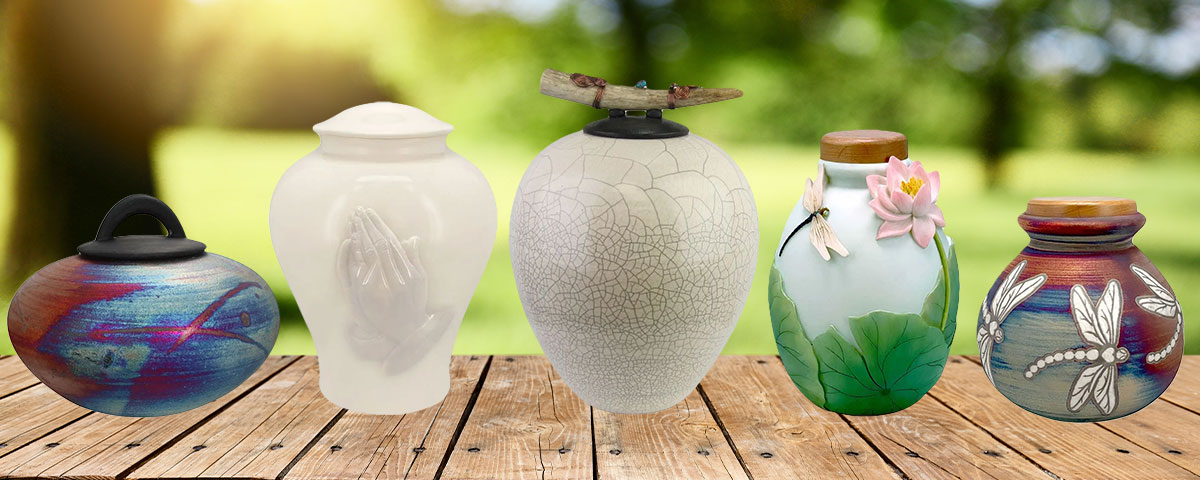

Marble Cremation Urns
There’s nothing more classic than marble, which makes marble urns an ideal choice for someone who prized elegance and grace. These urns cost $250 to $600, depending on size and composition. The best placement for marble urns varies on the material.
Natural marble urns have the classic look and color variations of marble because they are cut from natural stone. Natural marble is relatively durable but requires more care. You should keep it clean and dry, and minimize the use of harsh cleansers to remove dust or dirt. Although you can put a natural marble urn outside, you may want to consider using an urn vault to protect it.
By comparison, cultured marble is made from pulverized marble and manmade materials to increase strength and durability. Cultured marble provides a consistent look and can be pressed into a variety of shapes and sizes. This material makes an ideal choice for urn vaults, companion urns, and burial urns.
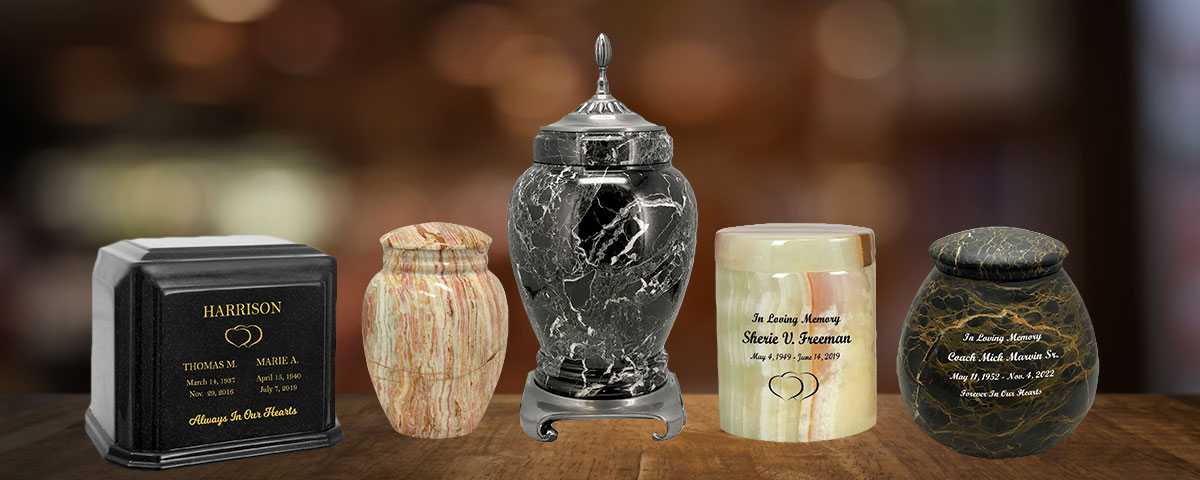

Glass Cremation Urns
Glass urns provide a wonderful combination of iconic style, unique design, durability, and ease of maintenance. These urns can be hand-blown or cut into interesting designs, in almost any color. Some manufacturers will allow you to incorporate a portion of the cremated remains into the actual glass material. Glass urns cost $100 to $400, and you can expect to pay more for customized designs or larger sizes.
Although glass is a fairly durable material, it may not work well for placement outdoors or in an unconditioned environment. Glass cannot support heavy weight, and it could crack or chip when exposed to extreme weather conditions. As such, glass urns work best for placement indoors. To keep it clean, you can wipe it with a dry cloth or use a small amount of glass cleaner.


Biodegradable Cremation Urns
Biodegradable urns provide a sustainable way to put a loved one’s cremated remains in a final place. Most biodegradable urns are made of some kind of paper, although they could be made of cellulose fiber, sand, or other natural materials. These urns tend to be more affordable, costing $25 to $200.
Some biodegradable urns allow you to bury them in dirt, while others have a design that makes it easy to place them on water for a water burial. Scattering urns are similarly affordable. They often come from biodegradable materials, and they make an ideal keepsake for a scattering service.
In most cases, biodegradable urns aren’t durable, because they are designed to break down quickly. As such, you may not be able to use them for a long-term placement. Urns made of paper may not be strong enough for transport, so you should consider using an additional container if you need to fly or drive a long distance to the destination.
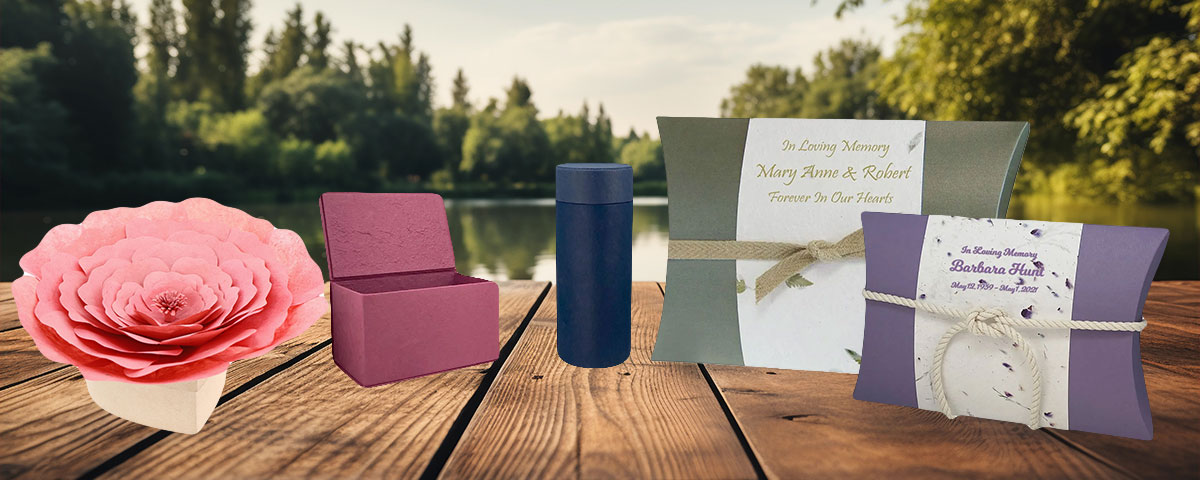

Materials for Burial Urns
There are a few different types of burial urns for cremation remains, depending on the method:
- Ground burial with permanent placement
- Green burial (earth friendly)
- Water burial
Although burial usually involves a permanent placement of the cremated remains, the way you approach the placement can vary. When most people think of burying remains, they imagine putting the urn in an urn vault in a burial plot, or placement in a cemetery’s columbarium. For this purpose, metal or stone make the best choices. You’ll probably need an urn vault to put remains in a cemetery’s burial plot.
Green burials and water burials are different. In these cases, you’re not looking to keep the remains and urn intact over time. Ideally in these circumstances, the urn will break down over the course of a few weeks. You may include seeds that can grow into perennial flowers or trees, with the remains in the ground underneath. Keep in mind that if you choose these options, you should get permission to bury or scatter the remains first.
Scattering urns can provide a temporary container until you have a scattering ceremony. These urns can be used for burial or scattering, if they are made of natural, biodegradable materials like paper. During a scattering ceremony, it is common to scatter the ashes, then rake them into the dirt or bury them so that the remains are not visible on the surface.
Given the different types of burials you can choose, urn cost ranges widely from $10 to $600. The most expensive options tend to be larger and meant for long-term placement, while the least expensive usually come in keepsake sizes.
Choosing the Right Urn
Finding the right urn can take some time, especially if you’re looking for the perfect resting place for a loved one. Understanding the common types of urn materials makes it easier for you to determine which ones will work best for your plans, your maintenance capacity, and your budget:
- Outdoor Placement: Metal, stone, or wood
- Ground Burial: Urn vaults, metal, or stone
- Indoor Placement: Metal, Stone, Wood, Ceramic, or Glass
- Water Burial or Green Burial: Biodegradable materials
Everyone deserves to have a final place to rest after they pass. Choosing cremation means that you don’t necessarily have to plan for a traditional cemetery burial, although it is an option. With these tips, you can select an urn material that ideally suits your needs and matches your memories of your loved one.
Key Takeaway:
Urns can be made out of many different materials. The most common urn materials include metal, wood, ceramic, marble, glass, and biodegradable paper. When choosing a material option for urns, consider the future placement of the urn, the durability of the material, and the cost of the urn. Metal, wood, and stone urns are suitable for outdoor placement, while ceramic and glass urns are better kept indoors. Biodegradable urns are appropriate for water burials or green burials.
MEET THE FOUNDER
Susan Fraser
Susan Fraser, founder of In the Light Urns, Inc., has spearheaded innovation in the memorial industry since 2001. After a personal tragedy, she began creating custom cremation urns for ashes that reflect a lost loved one's individuality. Susan's commitment to comfort makes her an authority on cremation and memorials, guiding and consoling families through understanding and compassion. With expertise and dedication, Susan's cremation guides give families invaluable resources for informed decisions.


Cremation Education
Cremation education informs diverse practices and ethics, empowering informed end-of-life choices.






